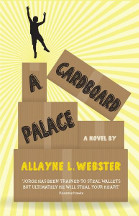A cardboard palace by Allayne Webster

Midnight Sun publishing, 2018. ISBN 9781925227253
(Ages: 10+) Highly recommended. Themes: Homelessness, Paris, Child
trafficking, Crime. A Notable Book in the CBCA 2018 awards, an
enlightening interview with Allayne Webster can be found at http://www.justkidslit.com/interviewbybook-with-allayne-webster/
which underlines her credentials for writing a book about homeless
youth in Paris. In 2010, she found herself watching a young boy slip
his hand into her husband's pocket and that scene helped develop her
character, Jorge, a homeless boy in Paris, used by Bill, along with
a number of other children to skim, scam and steal from people in
the streets. And this is not random, the children are taught to
target likely suspects, confuse and steal from them, then pass the
money onto Bill.
At night these children live in cardboard shanties on the outskirts
of Paris, some, like Jorge, hopeful that they will be able to leave
this life, but most simply living from day to day, grateful to be
fed and housed. Many of them are waifs, or bought from parents
believing they will be given work, or homeless children taken up by
adults who use them to make money.
In an unflinching story, Webster reveals the lives these children
live, many not yet in their teens, never going to school, avoiding
the police, aware all the time of the power of the men who control
them, living in abject poverty and often trafficked.
At times reading like a modern Oliver Twist, Webster has given this
theme a modern showing, revealing the children forced into this
life, exploited by others, forced sometimes into marriage, abused
and neglected.
The story comes to a head when the children find that their homes
will be bulldozed by the authorities and Jorge's friend, Ada is
about to be forced into a marriage she does not want. With help form
their Australian cook friend, Sticky, they take matters into their
own hands and survive the brutal lives they have endured.
This is a revealing story about desperate children exploited by
adults in one of the major cities in the world and it is a salutary
reminder to its readers that this is not just a Parisian problem.
Fran Knight